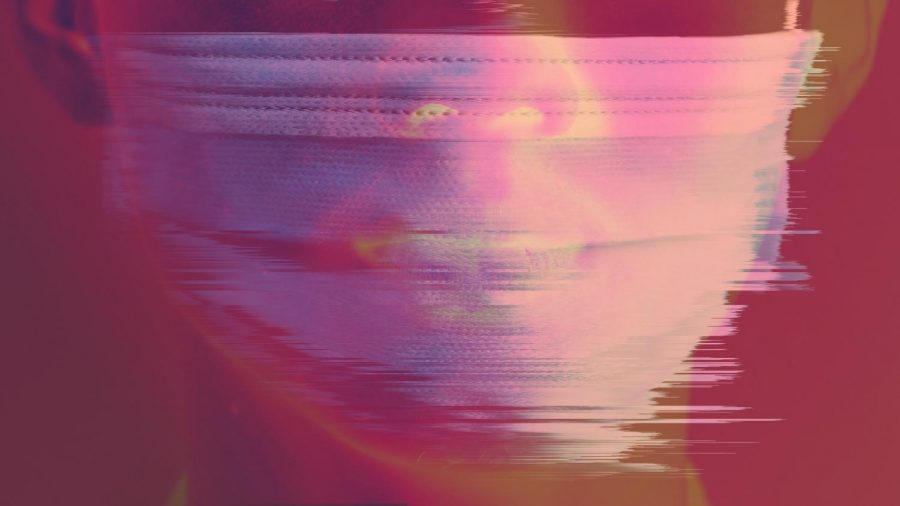Community Reflects on Overturned Mask Mandates and Limited COVID-19 Protocols at the U
(Design by Sydney Stam | The Daily Utah Chronicle)
February 27, 2022
Since the start of the spring semester, the University of Utah has advocated for masking when indoors, or when queueing outdoors on campus. Previously, this was backed by the mask mandate set in place by Salt Lake County, a decision that sparked mixed responses from students.
On Jan. 20, 2022, the Utah House of Representatives terminated the mask mandates set in place by the county health departments in Salt Lake and Summit Counties, removing the ability of the U to enforce this requirement on campus.
Muskan Walia, ASUU Senator for the College of Science, recounted the time leading up to the start of the spring semester when the U was left to decide how to deal with the Omicron surge. She says the academic senate had an emergency meeting to discuss what the semester should look like.
Walia says their options in responding were greatly limited by the state legislature’s decisions, especially S.B. 107, a bill passed in the 2021 General Session which requires institutions of higher education to offer “at least 75% as many in-person classes as they did in the second half of 2019.”
“Obviously we’re very grateful that a mask mandate for the first two weeks encompassed our school … but in that emergency Academic Senate meeting a lot of members expressed concern for the safety and well-being of members of the campus community,” Walia said. “They wanted instructors to have that flexibility and the opportunity to choose if they need to be remote … unfortunately it’s hard because we have to meet the demands of the Utah Senate Bill 107.”
Myrrandah Sawaya is a senior at the U majoring in English teaching. She was in support of the mask mandate being enforced at the U but would have liked it if the U went at least partially remote during this time.
“My opinion is that masks are, at worst, a minor inconvenience,” Sawaya said. “So if they can help to stop the spread of the virus, I just feel like it’s the least we could do. I do wish that at least during this wave of COVID, classes would be online. If they weren’t all online, I do wish there were at least enough options for people who want to take classes online.”
Sawaya is not attending any classes in person this semester. This decision was influenced by multiple factors including the rise in numbers due to Omicron, but the biggest reason was the safety of the people around her.
“I have a couple family members who I would like to see who were not able to get vaccinated, and then my partner is immunocompromised,” Sawaya said. “And one of my roommates works in healthcare, so it’s just like, I feel like I’m posing a greater risk to her to give it to her patients.”
The decision for Sawaya to go online was not an easy one, as it posed a major inconvenience when scheduling classes.
“It was super hard, and it sucks because I was signed up for 16 credit hours, but I had to drop two of my classes,” Sawaya said. “I had to go less than full time. I didn’t want to … and I did try to find an alternative. But there just weren’t the classes I needed being offered online so I just felt like I had to.”
Sawaya said she is confused by the state legislature’s authority over the U when it comes to deciding how many classes can be offered online.
“I don’t know why the legislature would feel like they … even need to make that call,” Sawaya said. “Students at the U are the people who are paying tuition and making the U possible. So I feel like their needs should be considered above all else.”
Walia says it is likely the U would have made different decisions if they were not restricted by the bill and that campus leadership has responded the best they could considering the circumstances.
“I know from the outside it’s easy to be like ‘No, school should be online’ … but what’s kind of behind the curtain is all of these constrictions given that we’re a public university,” Walia said.
One step ASUU took to help alleviate the situation was secure funding to provide a free pack of KN-95 masks to all students at the U. Walia was heavily involved in this process and said it seemed like the logical thing to do given ASUU’s mission to look out for the wellbeing of students.
“We were hearing in the news that cloth masks and surgical masks were no longer effective, so students needed these KN-95 masks but for like a pack of three they’re eight dollars and they’re very hard to get your hands on,” Walia said. “So it seemed [like] kind of a no-brainer … We have access to funds and our main goal is to be advocates for students … We need to invest in purchasing these KN-95 masks for the student body so that they can go to their classes feeling more secure.”
Walia says the process started with writing a proposal in which the involved ASUU members justified the need for the measure. These justifications cited the rising COVID-19 case numbers, dynamics of the omicron virus, the senate bill that required in-person classes, the research that has proven KN-95 masks to be more effective, and the ongoing mask mandate at the time that required students to wear masks on campus.
The proposal requested $50,000 to be allocated from the presidential operating budget to fund KN-95 masks for the community. This was presented to the Committee on Student Affairs, made up of stakeholders and students on campus. The proposal was passed in COSA and the best locations for pick-up points were chosen.
All students should have received an email from ASUU about the availability of these masks, with a link to the survey to claim them and a list of pick-up locations, which include the front desk of the Union, Kahlert Village, Lassonde, MHC, Gardener Commons and more. The survey allows students to choose a pick-up location, where they can go any time and present their U-card to claim their pack of five KN-95 masks.
Walia says her message to the student body would be to put compassion and empathy first and be willing to follow guidelines to protect each other during the current wave of COVID-19 cases.
“I would encourage the student body to wear masks inside of buildings and wear those KN-95s — there’s really no excuse to not wear them because you have access to them through ASUU,” Walia said. “We have a lot of incredible, talented professionals on this campus and following their guidance, what they spend so much of their time researching, is the best way to extend that compassion for your fellow students and teachers and staff so that we can all stay healthy and continue to have a good learning environment.”
Walia extends the same message to state legislators.
“To the legislators, I would really extend the same advice to prioritize their constituents’ health and wellbeing first and foremost beyond … the way they want to be perceived,” Walia said. “At the end of the day, compassion and empathy win above politics. “
Both Rep. Jennifer Dailey-Provost and Sen. Derek Kitchen, who represent the University of Utah in the state legislature, express frustration with the state legislature’s decision to terminate the mask mandate set by Salt Lake County.
Dailey-Provost says she disagrees with the procedural steps taken to terminate the mandate.
“With no public hearing and no public input, they suspended the rules to get that done,” Dailey-Provost said. “The way that they went about it really damages the integrity of the process that we take an oath to uphold.”
Kitchen says he is disappointed by the politicization of the mask mandate, which he said was a logical decision made by the county.
“I feel really sad that we have a political environment where public health and safety is secondary to making a statement,” Kitchen said. “About one-third of our state’s population live in Salt Lake County … it made perfect sense for the county mayor to make the call that we needed to mask up.”








